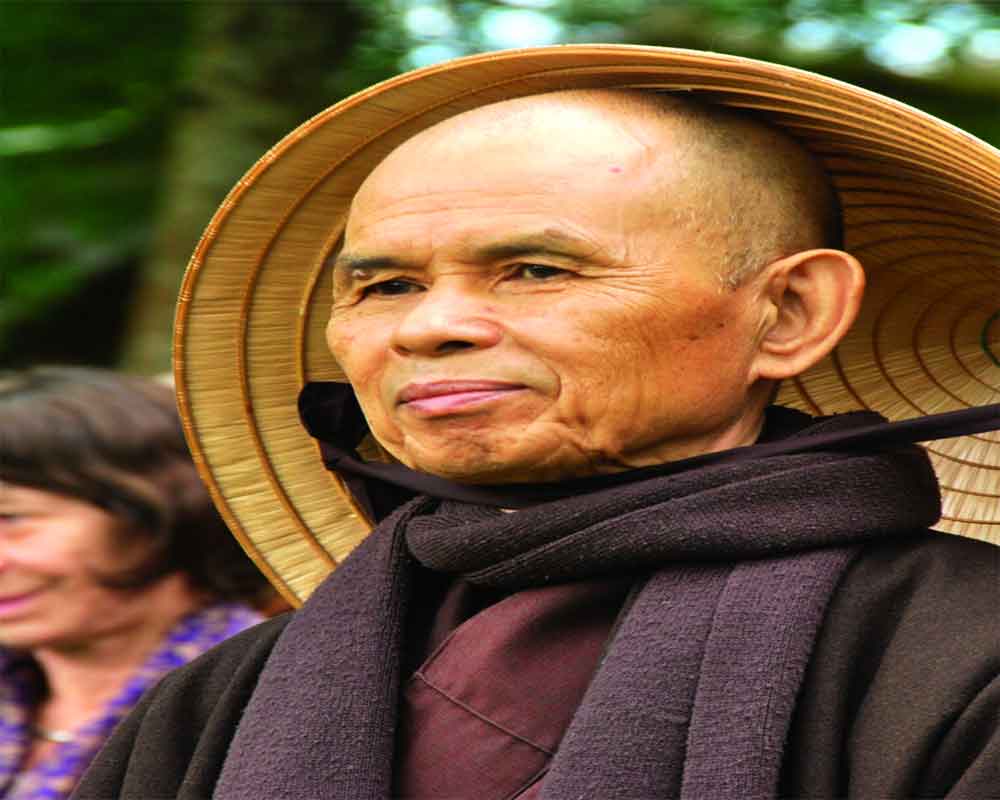Through his life, his books, and his teachings, he continues to illuminate the path towards a world suffused with love, understanding, and mindfulness
In the midst of escalating stress and uncertainty, mindfulness emerges as an indispensable tool for navigating the complexities of modern life. The relentless pace of society, coupled with incessant demands and pressures, often leaves individuals feeling overwhelmed and disconnected. In such turbulent times, mindfulness offers a lifeline, providing a refuge amidst the chaos. By cultivating a present-centered awareness and cultivating an attitude of acceptance, individuals can develop resilience in the face of adversity.
Mindfulness stands as a timeless practice with profound implications for modern living. In a world inundated with distractions and incessant stimuli, cultivating mindfulness offers a sanctuary of clarity and presence. By fostering a non-judgmental awareness of the present moment, mindfulness enables individuals to navigate life's challenges with grace and equanimity. It serves as a powerful tool for managing stress, anxiety, and emotional turmoil, allowing practitioners to cultivate resilience and inner peace amidst adversity. Moreover, mindfulness fosters deeper connections with oneself and others, fostering empathy, compassion, and understanding. As we embrace mindfulness, we unlock the profound potential to live more fully, authentically, and harmoniously in a world that often pulls us away from the essence of our being.
Mindfulness is the essence of Thich Nhat Hanh’s teaching. He taught just that and what is most amazing. He did it so effortlessly and calmly that even before one realised one was already drawn into it. Renowned globally as Thay, meaning "teacher" in Vietnamese, Thich Nhat Hanh embodies the essence of tranquility and wisdom. His journey, from the serene landscapes of central Vietnam to the bustling cities of the West, has been marked by a profound commitment to peace, compassion, and mindfulness.
Ahimsa Trust recently organised a session of meditation and lectures to promote his teaching in New Delhi. The occasion was the launch of his book ‘Good citizens.’ In this book Thich Nhat Hanh addresses citizens of every tradition, culture and religion to lay the foundations of a renewed ethic capable of leading humanity towards a world of peace and sharing of wealth, capable of overcoming divisions to live in total harmony. Through practical mindfulness exercises and examples taken from the life of the Buddha, the Vietnamese monk indicates a path entirely based on the Four Noble Truths of Buddhism: through awareness of the existence of pain and the search
for the roots of evil, we proceed to understand its causes to finally be able to embark on a path towards happiness and found a global ethic based on mutual respect.
Born in 1926, Nhat Hanh's spiritual odyssey began at the tender age of sixteen when he was ordained as a Buddhist monk. His early years were shaped by the tumultuous backdrop of war-torn Vietnam. Amidst the chaos, he co-founded the An Quang Buddhist Institute, a beacon of Buddhist studies amidst the strife. Embracing the teachings of Gandhi, he spearheaded nonviolent resistance movements, embodying the principles of Engaged Buddhism. In 1967 Martin Luthar King Jr won the Noble peace prize. In the crucible of war, Nhat Hanh faced a profound dilemma – whether to retreat into contemplation or to engage actively in alleviating suffering. Choosing the path of compassionate action, he founded the Engaged Buddhism movement, advocating for inner transformation as a catalyst for societal change.
Throughout the 1960s, Nhat Hanh's endeavours blossomed, from founding the Van Hanh Buddhist University to establishing the Order of Interbeing, a testament to his commitment to peace and enlightenment. His tireless advocacy earned him a Nobel Peace Prize nomination in 1967, a recognition of his unwavering dedication to nonviolence.
Despite exile from his homeland, Nhat Hanh's message of peace resonated globally. His pilgrimage took him to the far corners of the earth, where he tirelessly advocated for harmony and compassion. It was during this time that Plum Village, a sanctuary of mindfulness, took root in France, blossoming into a vibrant community dedicated to mindful living.
Nhat Hanh's teachings transcend boundaries, resonating across cultures and continents. His literary legacy, spanning over a hundred titles, serves as a beacon of enlightenment, guiding readers on the path to inner peace and understanding. Translated into myriad languages, his works continue to inspire and uplift souls worldwide.
In India, the seeds of Nhat Hanh's wisdom find fertile ground, with Ahimsa Trust leading the charge in disseminating his teachings. Publishers like Full Circle, Aleph, and Harper Collins have brought his works to Indian readers, fostering a culture of mindfulness and compassion. As Thich Nhat Hanh's legacy continues to flourish, his message of peace and enlightenment remains as vital as ever.


























